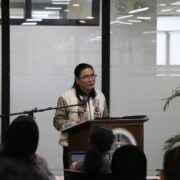Thinking machines and unthinking humans

An international “AI Action Summit” was recently held in Paris, France, co-chaired by the President of France and the Prime Minister of India. In its press release on the summit, the French government characterized the summit on artificial intelligence as being committed to promoting safe and secure AI, particularly by providing the necessary tools to mitigate the risks and concerns prominent in two previous summits on AI in Bletchley Park, UK in 2023, and Seoul, South Korea in 2024.
In contrast to those summits that focused more on the potential risks and harms posed by advanced AI that includes human extinction, this year’s event had a more optimistic outlook regarding the opportunities and potential presented by the technology.
While 60 countries signed a declaration that outlined policies for ensuring AI becomes “open, inclusive, transparent, ethical, safe, secure and trustworthy,” the US and the UK did not, with the latter citing national security concerns. Furthermore, some experts at the summit noted that the declaration did go far enough to address the possible risks and harm caused by AI.
While I am not against advanced AI per se, I find myself agreeing with those who call for caution and circumspection. Advanced AI is like atomic energy, which can be a powerful source of clean energy to help countries achieve economic growth and improve the lives of their citizens. On the flipside, it can be an instrument for mass destruction.
One of AI’s potential harm is its impact on workers who might be replaced by these more efficient and productive “thinking machines” that don’t need to eat, sleep, have medical insurance, take vacations, etc. In response, its proponents argue that AI is not meant to replace human workers, but would be a tool to make them more efficient at doing their tasks or carrying out their work.
That’s a fair argument to make, and I would support that as I have benefited from such type of technological and digital innovations that enable me to work better and more efficiently. However, we need to be careful as we are now standing on a slippery slope and need to be cautious and vigilant moving forward. It’s one thing to have online search engines help us quickly find information we need, and quite another to have AI put together a summary or essay for us without us having to go through the whole book or various source materials. The former still requires us to exercise cognitive function and thinking to synthesize and put together all the information gathered, while the latter simply allows AI to do the thinking for us.
This is a concern that has cropped up in discussions in my circle of friends, especially those with young children. For those of us who have experienced the world before the internet and social media, we can easily understand and be concerned about today’s much younger generation having access to tools and technology that can draft emails for them, provide a book report without having to read the book, and explain issues without them going through the process of collecting information from various sources and exercising critical thinking to come up with a conclusion or opinion. Utilizing AI, they are conveniently provided information via a chat prompt. The potential harm posed by social media and its influence on how people think is bad enough, how much more with advanced AI and its potential to impair a person’s ability to think critically or even perform basic cognitive tasks, since it becomes much more convenient to let the machine do the thinking for you.
At the ARC Conference 2025 the other week in London, a speech by Sophie Winkleman, who serves on the board for a chain of academy schools in the UK and campaigns against screens for children, warned against the adverse effects of excessive use of technology in our education systems. In her speech, she asks “how will children who are so constantly artificially stimulated ever learn to think, imagine, create or just be still?”
In fact, here in Sweden where I am currently based, there is a push to move young students off digital devices and on to books and handwriting. This back-to-basics approach was a response to a perception that a hyper-digitalised approach to education led to a decline in basic skills, though experts are still debating the pros and cons of that conclusion. But even if schools take this step, young children nowadays are savvy enough to access AI technology online outside of such settings.
Despite those concerns, the use of advanced AI is inevitable, and just like atomic energy, we’d have to embrace it. We just need to make sure we exercise continued vigilance so that it is used for the benefit of humanity and we can avoid establishing a future society made up of thinking machines and unthinking humans.
—————–
Moira G. Gallaga has served three Philippine presidents as protocol officer, and has been posted as a diplomat at the Philippine Consulate General, LA, and the Philippine Embassy, Washington.

















